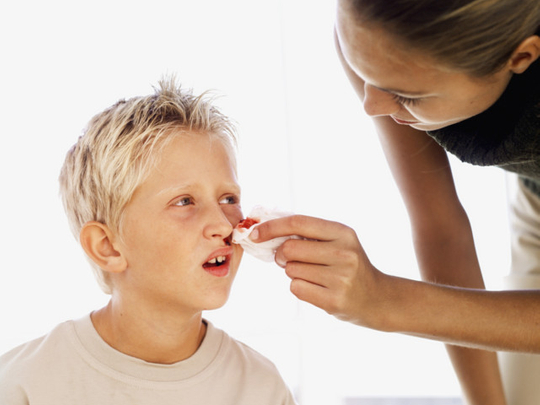
1 The inner surface of the nose has a number of blood vessels that are close to the surface and that makes nose bleeds common. There are a number of reasons for a nosebleed; one of them being the hot, dry climate that causes the moist tissue in the nose to turn dry and bleed. Among children, it is common due to picking the nose. Vigorous nose blowing due to a bad cold could also lead to bleeding.
2 A nose bleed can be stopped by making the person sit up, lean forward and breathe through the mouth. The person should pinch the soft part of the nose for about five minutes. Check if the nose is still bleeding after five minutes; a nasal decongestant can be helpful. Once the bleeding has stopped, the person should avoid straining or lifting heavy weights. Do not rub the nose and do not pick the nose. If the bleeding does not stop within 15 to 20 minutes and it is profuse, the person should be taken to a hospital emergency section. It may need nasal packing, cautery of nasal mucosa, control of high blood pressure or removal of a foreign body.
3 Certain medications can cause a nosebleed; if the patient takes aspirin or other pain killers, or a blood-thinning medication such as an anticoagulant (warfarin). A tumour or growth in the nose can also cause a nosebleed and it is one of the signs of disorders of the blood-clotting mechanism in the body.
4 People with infections of the nose and sinus are usually prone to nosebleeds. Those with an allergy and with high (uncontrolled) blood pressure are also prone. A trauma to the nose or a surgery of the nose are other causes.
5 Certain foods rich in salicylate can cause nosebleed in persons prone to them. Fruits such as berries and dry fruits are rich in salicylate. Herbs and spices such as curry powder, ‘garam masala’ and thyme, for example, have high content of salicylate.
Information: Dr. Suresh Puri, internal medicine consultant and pulmonologist, JTS Medical Centre. (Information: Dr. Suresh Puri, Consultant Internal Medicine and Pulmonologist, JTS Medical Centre).











